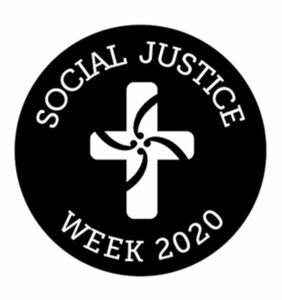Social Justice Week 6-12 September
Catholic social teaching articulates a vision which springs from Scripture and has taken shape down the centuries. It is a vision that takes as its starting point God’s creation of human beings “in the image and likeness of God” (Genesis 1:27). It keeps in mind the covenants of the Old Testament and Our Lord’s parables about the rich man and Lazarus (Luke 16:19-31), the rich man and his barns (Luke 16:19-31), the good Samaritan (Luke 10:29-37) and the sheep and the goats (Matthew 25:31-46).
This vision has been communicated universally in papal encyclicals and pastoral letters from various popes, and locally in pastoral letters from our bishops.
Catholic social teaching incorporates a myriad of topics, among them:
• the development and dignity of every human being
• the sanctity of human life
• rights, responsibility and freedom
• the importance of the family as the basis of society
• social justice and social equality
• the preferential option for the poor
• respect for culture and cultural differences
• economic justice, workers’ rights and just wages
• the dignity of work
• subsidiarity and the role of government
• participation in civil and political processes
• global development and peace
• care for creation
The Church speaks out on political and economic issues to protect and promote the dignity of families and workers. It has had a sense of its obligation to help the poor since apostolic times, as evidenced by St Paul’s collection for the poor of Jerusalem –- spoken of in 2 Corinthians 8:1-15 and Acts 20:1-5, among other places. And at the Council of Jerusalem, Paul had been urged to “be mindful of the poor”, as he was keen to do (Galatians 2:10).
Early in the 5th century, St Augustine assisted those in poverty, alleviated hunger and brought about peace for the people of his diocese. In the Middle Ages, St Thomas Aquinas developed teaching on property ownership, Church/state relations and the role of government.
Pope Leo XIII’s encyclical Rerum Novarum was published in 1881. In it, the pope dealt with the terrible effects of the Industrial Revolution. Since then, popes have consistently supported the rights and dignity of the poor and marginalised. Such teaching continues to be necessary, as the rich accumulate even more wealth, condemning the poor to even greater poverty.
In Laudato Si’ #82, Pope Francis wrote:
When nature is viewed solely as a source of profit and gain, this has severe consequences for society. This has engendered immense inequality, injustice and acts of violence against the majority of humanity since resources end up in the hands of the first comer or the most powerful: the winner takes all. Entirely at odds with this model are the ideals of harmony, justice, fraternity and peace as proposed by Jesus.
And in Evangelii Gaudium:
Each individual Christian and every community is called to be an instrument of God for the liberation and promotion of the poor, and for enabling them to be fully a part of society (#187).
It is essential to draw near to new forms of poverty and vulnerability, in which we are called to recognise the suffering Christ, even if this appears to bring us no tangible and immediate benefits. I think of the homeless, the addicted, refugees, indigenous peoples, the elderly who are increasingly isolated and abandoned, and many others. Migrants present a particular challenge for me since I am a pastor of a Church without frontiers, a Church which considers herself mother to all. For this reason, I exhort all countries to a generous openness (#210).
In its social teaching, the Church speaks truth to power. The United Nations’ efforts to do the same are frustrated continuously by nationalism and factionalism to such an extent that the UN has become a toothless tiger. The Church remains one of the few institutions that has the prestige to influence world leaders to promote justice for all peoples.
Social Justice Week 2020 in New Zealand focuses on Catholic social teaching principles. The Caritas website – caritas.org.nz -- carries helpful and enlightening information and it is well worth a look.

 Entries(RSS)
Entries(RSS)